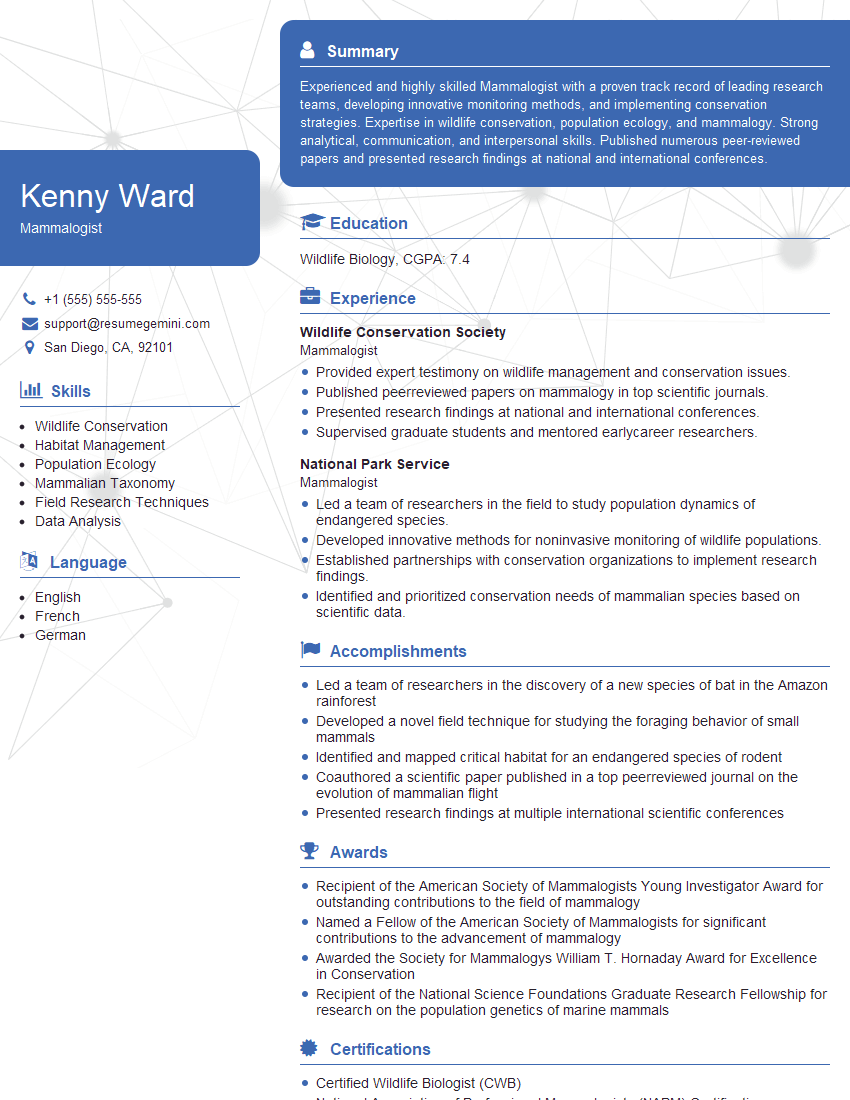Are you a seasoned Mammalogist seeking a new career path? Discover our professionally built Mammalogist Resume Template. This time-saving tool provides a solid foundation for your job search. Simply click “Edit Resume” to customize it with your unique experiences and achievements. Customize fonts and colors to match your personal style and increase your chances of landing your dream job. Explore more Resume Templates for additional options.

Kenny Ward
Mammalogist
Summary
Experienced and highly skilled Mammalogist with a proven track record of leading research teams, developing innovative monitoring methods, and implementing conservation strategies. Expertise in wildlife conservation, population ecology, and mammalogy. Strong analytical, communication, and interpersonal skills. Published numerous peer-reviewed papers and presented research findings at national and international conferences.
Education
Wildlife Biology
February 2018
Skills
- Wildlife Conservation
- Habitat Management
- Population Ecology
- Mammalian Taxonomy
- Field Research Techniques
- Data Analysis
Work Experience
Mammalogist
- Provided expert testimony on wildlife management and conservation issues.
- Published peerreviewed papers on mammalogy in top scientific journals.
- Presented research findings at national and international conferences.
- Supervised graduate students and mentored earlycareer researchers.
Mammalogist
- Led a team of researchers in the field to study population dynamics of endangered species.
- Developed innovative methods for noninvasive monitoring of wildlife populations.
- Established partnerships with conservation organizations to implement research findings.
- Identified and prioritized conservation needs of mammalian species based on scientific data.
Accomplishments
- Led a team of researchers in the discovery of a new species of bat in the Amazon rainforest
- Developed a novel field technique for studying the foraging behavior of small mammals
- Identified and mapped critical habitat for an endangered species of rodent
- Coauthored a scientific paper published in a top peerreviewed journal on the evolution of mammalian flight
- Presented research findings at multiple international scientific conferences
Awards
- Recipient of the American Society of Mammalogists Young Investigator Award for outstanding contributions to the field of mammalogy
- Named a Fellow of the American Society of Mammalogists for significant contributions to the advancement of mammalogy
- Awarded the Society for Mammalogys William T. Hornaday Award for Excellence in Conservation
- Recipient of the National Science Foundations Graduate Research Fellowship for research on the population genetics of marine mammals
Certificates
- Certified Wildlife Biologist (CWB)
- National Association of Professional Mammalogists (NAPM) Certification
- Certified Animal Care Professional (CAP)
- Certified Field Biologist (CFB)
Career Expert Tips:
- Select the ideal resume template to showcase your professional experience effectively.
- Master the art of resume writing to highlight your unique qualifications and achievements.
- Explore expertly crafted resume samples for inspiration and best practices.
- Build your best resume for free this new year with ResumeGemini. Enjoy exclusive discounts on ATS optimized resume templates.
How To Write Resume For Mammalogist
- Highlight your research experience and expertise in mammalogy in your resume
- Showcase your skills in field research techniques, data analysis, and population ecology
- Emphasize your ability to work independently and as part of a team
- Quantify your accomplishments whenever possible to demonstrate the impact of your work
Essential Experience Highlights for a Strong Mammalogist Resume
- Led a team of researchers in the field to study population dynamics of endangered species.
- Developed innovative methods for noninvasive monitoring of wildlife populations.
- Collaborated with conservation organizations to implement research findings.
- Identified and prioritized conservation needs of mammalian species based on scientific data.
- Provided expert testimony on wildlife management and conservation issues.
- Published peer-reviewed papers on mammalogy in top scientific journals.
- Presented research findings at national and international conferences.
- Supervised graduate students and mentored early-career researchers.
Frequently Asked Questions (FAQ’s) For Mammalogist
What is a Mammalogist?
A mammalogist is a scientist who studies mammals, the class of animals that includes humans, apes, monkeys, bats, rodents, carnivores, ungulates, and marine mammals.
What are the educational requirements to become a Mammalogist?
A bachelor’s degree in wildlife biology, zoology, or a related field is typically required. Many mammalogists also earn a master’s degree or doctorate.
What are the job responsibilities of a Mammalogist?
Mammalogists conduct research on the behavior, ecology, and conservation of mammals. They may work in the field, in a laboratory, or in a museum.
What are the career prospects for Mammalogists?
Mammalogists can work for government agencies, universities, or non-profit organizations. They may also work as consultants or in the private sector.
What are the challenges facing Mammalogists?
Mammalogists face a number of challenges, including habitat loss, climate change, and poaching. They also face the challenge of communicating their research findings to the public and to policymakers.